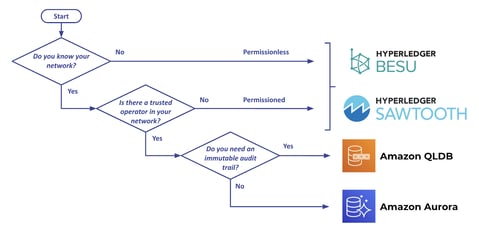Identifying the Right Technology for Your Multiparty Business Processes
Blockchain Technology Partners offers infrastructure choices for distributed, multiparty workflows. In this guest blog, Csilla Zsigri, VP, Marketing and Strategy at Blockchain Technology Partners explains the suitability of the various technology options.
Identifying the right technology for digitizing processes that involve multiple parties within and across organizations, has plagued businesses for decades. Information technology and operations executives are looking for the right technology to use for business-critical applications involving both trusted and untrusted parties.
To help companies select a suitable technology for their multiparty workflows and distributed applications, we have created a simple decision tree, with three key questions to consider:
- Do you know and trust the participants in your business network?
- Does your business network have or need a trusted operator?
- Do you need an immutable audit trail for your business process?
Let’s go through these questions, one by one.
Do you know and trust the participants in your business network?
If the answer to this question is ‘No,’ and your company seeks to interact and transact more efficiently - by eliminating frictions - with multiple untrusted organizations; a permissionless blockchain implementation will enable you and the other members in your business network to share information and collaborate securely, without a central authority, and with none of the individual parties having the ability to one-sidedly enforce decisions, either accidentally or in bad faith.
Blockchain Technology Partners’ infrastructure management offering supports Hyperledger Besu, a core ledger protocol that combines both permissionless and permissioned features. Hyperledger Besu is essentially an Ethereum client that supports various consensus mechanisms, and its permissioning schemes were designed to be used in consortium environments.
If the answer to this question is ‘Yes,’ then you should move on to the second question in the decision tree.
Does your business network have or need a trusted operator?
If the answer to this question is ‘No,’ you may consider the implementation of a permissioned blockchain network for running your multiparty business process. Hyperledger Sawtooth, in particular, offers a flexible and modular architecture, and supports various consensus mechanisms and smart-contract languages. Blockchain Technology Partners has released a freely available, enterprise-grade distribution of Hyperledger Sawtooth - dubbed BTP Paralos - ideal for production and business-critical environments.
If the answer to this question is ‘Yes,’ then you should move along to the third and final question in the decision tree.
Do you need an immutable audit trail for your business process?
If the answer to this question is ‘Yes,’ you may consider using a blockchain-powered distributed database technology that provides data integrity alongside privacy. Amazon QLDB, in particular, was designed to support transaction immutability offered by blockchain technology, yet it provides a centralized model to ensure data privacy.
For use cases where immutability is not required, but the ability to automate multiparty workflows is desired, a relational database such as Amazon Aurora coupled with a smart-contract capability such as Daml at the application layer, may be a suitable choice.

When we are done with the decision tree...what then?
Overcoming shortages in IT skills and resources is one of the key challenges associated with digital transformation overall, and distributed ledger technology is no exception. With Sextant, Blockchain Technology Partners offers to free organizations from all the infrastructure pain involved with setting up and running a blockchain network, to ultimately enable them to build distributed applications and multiparty systems with ease. Distributed ledgers currently supported by Sextant include Hyperledger Besu and Hyperledger Sawtooth.
BTP’s Sextant also supports Daml, an open-source smart-contract programming language created by Digital Asset. Smart contracts have become known to the world as transaction protocols running on a blockchain or distributed ledger, embodying the self-enforcing business logic of a multiparty application or business process. Daml was purpose-built for coding complex multiparty business processes, and designed to work with different blockchains, distributed ledgers, as well as databases.
Blockchain Technology Partners and Digital Asset have teamed up to launch ‘Sextant for Daml,’ a joint, commercial offering that enables organizations to build and deploy smart contracts with little effort and no special expertise, on a variety of persistence layers. Sextant for Daml supports Hyperledger Besu, Hyperledger Sawtooth, as well as Amazon QLDB, Amazon Aurora and PostgreSQL.
For more information on Sextant, click here. Get in touch: daml@blockchaintp.com.
For more information on Daml, click here. Get in touch: sales@digitalasset.com.
